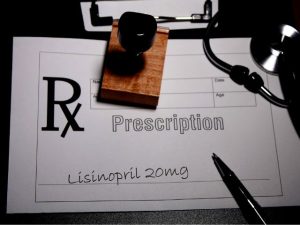Indications
ACE inhibitors are indicated in the following conditions:
- Hypertension
- Congestive heart failure
- Myocardial infarction
- Diabetic nephropathy and pheochromocytoma
- Aortic and mitral valve regurgitation
In hypertension, angiotensin-converting enzyme inhibitors are considered first-line therapy, alone or in combination with a diuretic. They are useful in decreasing elevated blood pressure by lowering the total peripheral resistance or afterload. They dilate the veins and arteries due to the reduced formation of angiotensin II. Due to this, these drugs can cause natriuresis and diuresis, hence decreasing blood volume and cardiac output. These drugs also help in lowering arterial pressure.
They are also essential in treating hypertension due to renal artery stenosis, in which renin-dependent hypertension occurs due to increased renin release from the kidney.
In heart failure, ACE inhibitors reduce afterload and slightly increase the stroke volume and cardiac output. They also cause a decrease in left ventricular filling pressures, mean arterial pressure, and pulmonary and systemic vascular resistance without an increase in heart rate.
They can also decrease the high levels of catecholamines indirectly. They reduce plasma vasopressin and endothelial levels that are elevated in congestive heart failure and cause an increase in vascular resistance.
Moreover, they can slow down the progress of congestive heart failure by limiting left ventricular hypertrophy.
ACE inhibitors are used as monotherapy if a patient is asymptomatic. But if the patient is symptomatic, ACE inhibitors should be combined with a diuretic. ACE inhibitors, combined with diuretics, prevent diuretic-induced activation of the renin-angiotensin system and do not cause hyperkalemia.
In myocardial infarction, ACE inhibitors have shown improvement in survival and morbidity. In the acute phase, they reduce the incidence of ventricular arrhythmias and reduce catecholamine levels. In the chronic phase, ACE inhibitors reduce the incidence of congestive heart failure. Also, they prevent ventricular remodeling. They should be started within 24 hours of myocardial infarction and can be used as a long-term therapy.
These drugs help in the management of diabetic nephropathy due to type I insulin-dependent diabetes mellitus. They reduce the progress of renal insufficiency and stop the worsening of renal function. ACE inhibitors can also be used in pheochromocytoma because they can decrease elevated blood pressure due to increased plasma renin.
ACE inhibitors are indicated in aortic valve regurgitation because they increase left ventricular ejection fraction (LEVF) while keeping the forward fraction of systolic volume (SV) unchanged. In mitral valve regurgitation, they keep the left-ventricular ejection fraction unchanged while increasing the systolic volume.








